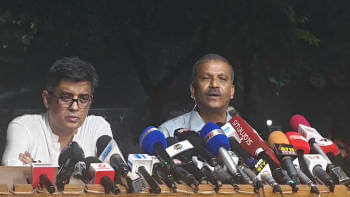Zero net carbon emission: An untenable imperative

As we witness the devastation caused by climate induced disasters around the world and the floods across our nation, it becomes painfully clear that the impacts of climate change and global warming are no longer distant threats but a harsh reality.
Bangladesh, long vulnerable to environmental disasters, once again finds itself at the epicentre of a climate crisis. This situation has thrust sustainability into the national spotlight, underscoring the urgent need for a swift transition to greener practices across all sectors. As the backbone of our economy, the readymade garment (RMG) industry must play a pivotal role in this transformation.
Economic sustainability is intrinsically linked to environmental sustainability. The costs of inaction -- both financial and social -- are immense. Climate-induced disruptions can lead to economic instability, threatening the very fabric of society. Therefore, achieving net-zero carbon emissions is crucial, not just for the environment but also for safeguarding the economy and ensuring social stability.
The interim government of Bangladesh has recognised the critical importance of sustainability, prioritising it as a national goal. Nobel laureate Dr Muhammad Yunus, a prominent advocate for social business and head of the interim government, has emphasised the need for achieving net-zero carbon emissions in his recent book. Yunus's vision for a sustainable Bangladesh aligns with the global shift towards greener economies and underscores the importance of integrating sustainability into the core of our economic and social policies.
For the RMG sector, sustainability is no longer an option; it is a prerequisite for continued growth. Global demand for sustainable and ethically produced garments is rising, driven by consumers who are increasingly mindful of the environmental impact of their purchases. International laws and regulations, such as the EU Green Deal, are setting new standards for sustainability that will eventually influence all countries, including Bangladesh.
The RMG sector is already playing a proactive role in driving sustainability initiatives, recognising that its future depends on the ability to adapt to changing environmental conditions and consumer expectations. From adopting energy-efficient technologies to reducing water usage and minimising waste, the sector is taking significant steps towards sustainability.
As Bangladesh stands on the brink of a new era, it is witnessing the birth of a transformed nation -- one that is more resilient, forward-thinking, and ready to embrace the challenges of the future. This new Bangladesh is defined not just by economic growth but by its commitment to sustainability, inclusivity, and social equity. The choices we make today will shape the future of this nation, determining whether it will continue to thrive in a world increasingly characterised by environmental and social challenges.
Now is the time for all stakeholders -- the government, businesses, civil society, and individuals -- to unite in a collective effort to ensure this transformation is a sustainable one. We must harness the spirit of innovation and the power of community to build a Bangladesh that not only meets the needs of the present, but also safeguards the future for generations to come. The birth of this new Bangladesh is our opportunity to create a legacy of sustainability, resilience and shared prosperity. Let us seize this moment and take decisive action to ensure that this vision becomes a reality.
The author is a director of the Bangladesh Garment Manufacturers and Exporters Association

 For all latest news, follow The Daily Star's Google News channel.
For all latest news, follow The Daily Star's Google News channel. 



Comments